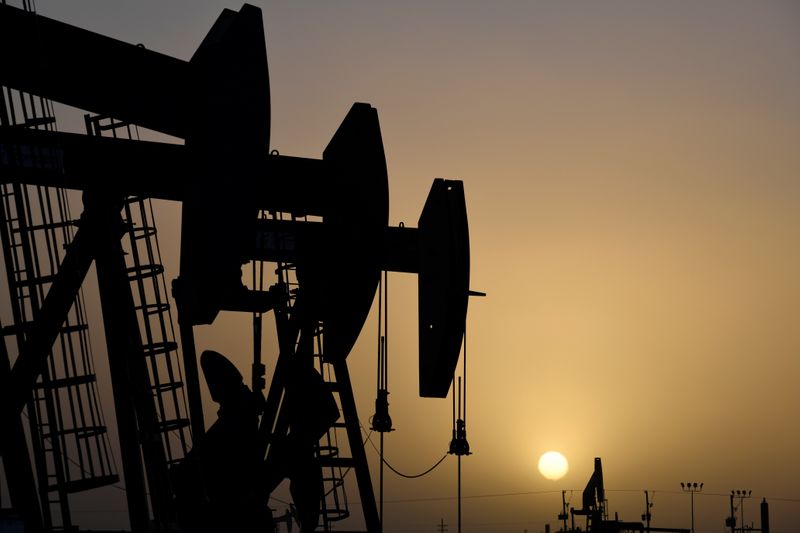By Jennifer Hiller and Liz Hampton
HOUSTON (Reuters) - Vastly slower U.S. oil growth this year and the prospect of a plateau for the world's top oil producer have signaled a new and unfamiliar era of self-restraint for the go-go shale industry.
Spending cuts and production declines common to shale wells mean U.S. output growth is expected to brake from 2019's pace that pushed domestic production past 13 million barrels per day (bpd). Some analyst forecasts for next year call for growth to slow, potentially to a rate of just 100,000 new bpd.
Over the latest decade, the shale revolution turned the United States into the world's largest crude producer and a force in energy exports. Yet the revolution did not translate to higher stock prices. The S&P 500 Energy sector only gained 6% for the decade, far less than the 180% return for the broader stock market.
The decade-long oil expansion failed to boost profits, which has discouraged investors. The shale industry was squeezed by an OPEC price war that began in 2014, sending U.S. crude prices below $30 per barrel at one point.
Production temporarily slowed, but accelerated into the end of the decade as companies cut costs and grew more efficient. Now, with investor returns flagging, the industry no longer believes in drilling its way to success even at higher prices.
“The drumbeat has been loud and uniform from investors,” said Parsley Energy (N:PE) Chief Executive Officer Matt Gallagher. The shale producer's spending next year will drop about 15% and will not rise even if oil prices do, instead using higher returns to pay down debt, he said.
Graphic: U.S. drilling rigs at work https://fingfx.thomsonreuters.com/gfx/ce/7/7870/7852/shale1.png
“We had to be a competitive and profitable business, not just recover resource at all cost,” said Gallagher of the industry's shift in thinking. Parsley started paying a quarterly dividend for the first time in September.
Analysts currently expect U.S. crude oil to average around $58 per barrel in 2020, which would represent a modest pullback from current levels.
Yet even if oil prices were to remain above $60 a barrel next year, analysts say it will not spur another production spurt because of the pressure for returns. Despite U.S. and international crude prices gaining 26% and 26%, respectively, the S&P 500 Energy Index (SPNY) rose less than 8% in 2019.
"Our view is that (rapid growth) is kind of over," said Raoul LeBlanc, an energy analyst with consultancy IHS Markit. Because oil output from shale drops off quickly, wells require constant, costly drilling to keep production levels steady.
In Texas, home of the Permian Basin shale field, the finishing touches to coax a well to produce, called completions, fell 16% though November, according to the state's energy regulator. Hiring in the Permian also dropped sharply in late 2019, according to career website LinkedIn (NYSE:LNKD).
As shale's outlook cools, the only oil producers maintaining annual Permian growth rates near 40% are giants Exxon Mobil Corp (N:XOM) and Chevron Corp (N:CVX) and some private operators, said Artem Abramov, head of shale research at consultancy Rystad Energy.
Morgan Stanley (NYSE:MS) noted in early December that publicly traded shale companies' output growth was just 460,000 bpd for the 12 months ending in September, compared with 1.3 million bpd for the 12 months before that.
Graphic: Fewer new jobs in top U.S. shale patch signal end of hiring boom https://fingfx.thomsonreuters.com/gfx/ce/7/7873/7855/shale4.png
Financing for new production has been sharply limited. Private equity firms that funded explorers and profited by selling to rivals now must nurture these operations for the long haul, said Adam Waterous, chief executive of private equity firm Waterous Energy Fund.
"In 50 years of investment in oil and gas investment that has never been seen before," Waterous said at a December investment conference in Houston. The change has investors in a state that resembles the five stages of grief, he joked.
U.S. producers are "still going to need another year or two to get free cash flow yields up to levels that are competitive," said Rob Thummel, portfolio manager at Tortoise Capital, which owns shares in shale producers' Concho Resources Inc (N:CXO), Diamondback Energy Inc (O:FANG) and Pioneer Natural Resources Co. (N:PXD)

Graphic: U.S. producers' greater efficiency keeps oil output rising amid cutbacks https://fingfx.thomsonreuters.com/gfx/ce/7/7872/7854/shale3.png